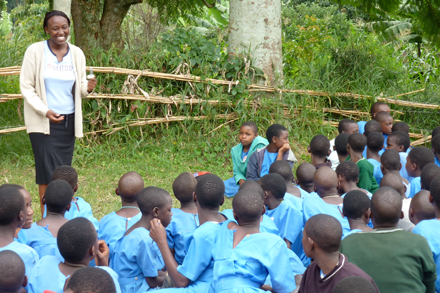
Stars in Global Health program funds innovations that could transform the way disease is treated in the developing world
By McGill Reporter Staff
Five McGill researchers have been awarded grants of $100,000 each by Grand Challenges Canada for new health projects to reduce debilitating disease and save lives in developing countries.
The grants were announced as part of Round 4 of the Stars in Global Health program, which funds breakthrough and affordable innovations that could transform the way disease is treated in the developing world — innovations that may benefit the health of developed world citizens as well. Grand Challenges Canada, which is funded by the Government of Canada, will be handing out a total of 102 new grants of $100,000. Of these, 59 grants went to innovators in 13 low- and middle-income nations worldwide to pursue bold new imaginative ideas to tackle health problems in resource-poor countries. Grants of $100,000 each were also announced for 43 Canadian-originated projects, including McGill’s, to be implemented in a total of 49 countries throughout the developing world. A total of roughly $10.9 million will support the global portfolio of projects.
The McGill grantees are:
Prof. Greg Matlashewski: Development of a diagnostic test to detect Leishmania in the blood
Visceral leishmaniasis is among the most deadly infectious diseases of the developing world. But effective treatments now exist. It is however necessary to develop effective diagnosis to ensure treatment is provided to those in need. This project will develop rapid diagnostic test able to detect Leishmania in the blood.
View a video about the project here:
Dr. Richard Gold: Building Social Capital for Health Innovation
The project team will work with local innovators in Nairobi to help bring technology with significant local health promise to people in need with the assistance of philanthropists and companies.
View a video about the project here:
Dr. Colin Chapman: A union between basic health care and conservation through mobile clinics
Protected areas are critical to conservation, but they can result in worse health for adjacent communities. The project will develop a mobile health system around Kibale National Park, Uganda. This will involve an ambulance travelling to communities around the park providing health care, family planning, health education, and promoting conservation.
View a video about the project here:
Dr. Mindy Levin: Improving rehabilitation services through evidence-based practice – assessing neurological recovery
The project will develop a low-cost portable device to accurately measure motor problems in people with stroke. This new measure will improve diagnosis and progress monitoring and lead to better treatment prescription and patient outcomes.
View a video about the project here:
Dr. Mohsen Akbari: A rapid low-cost test for pulmonary tuberculosis in low-income countries
Our bold idea is to develop a low-cost platform for rapid detection of tuberculosis in low-income countries. Here, at the Department of Biomedical Engineering of McGill University and in collaboration with the BigTech Labs in India, we will design and build a low-cost and electricity free thermal cycler that amplifies the myobacteria’s DNA in sputum samples. We envision that our device will be extremely useful in remote areas, where access to standard lab infrastructure is limited.
View a video about the project here:
Click here to learn more about the Stars in Global Health program.
